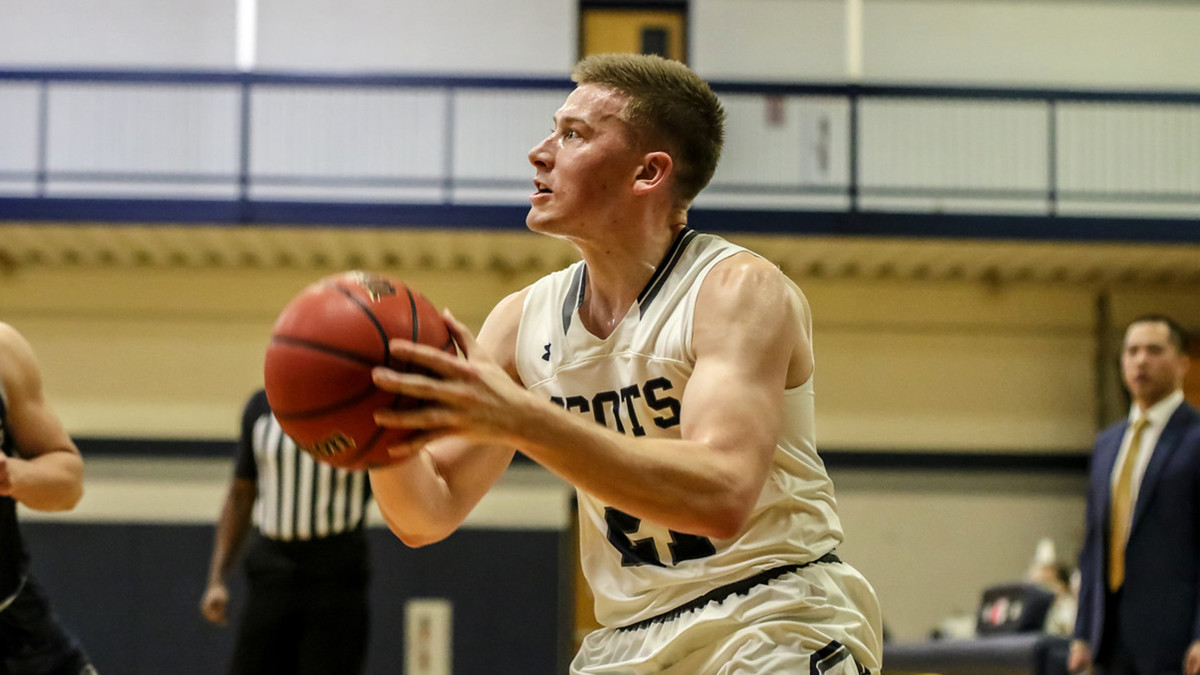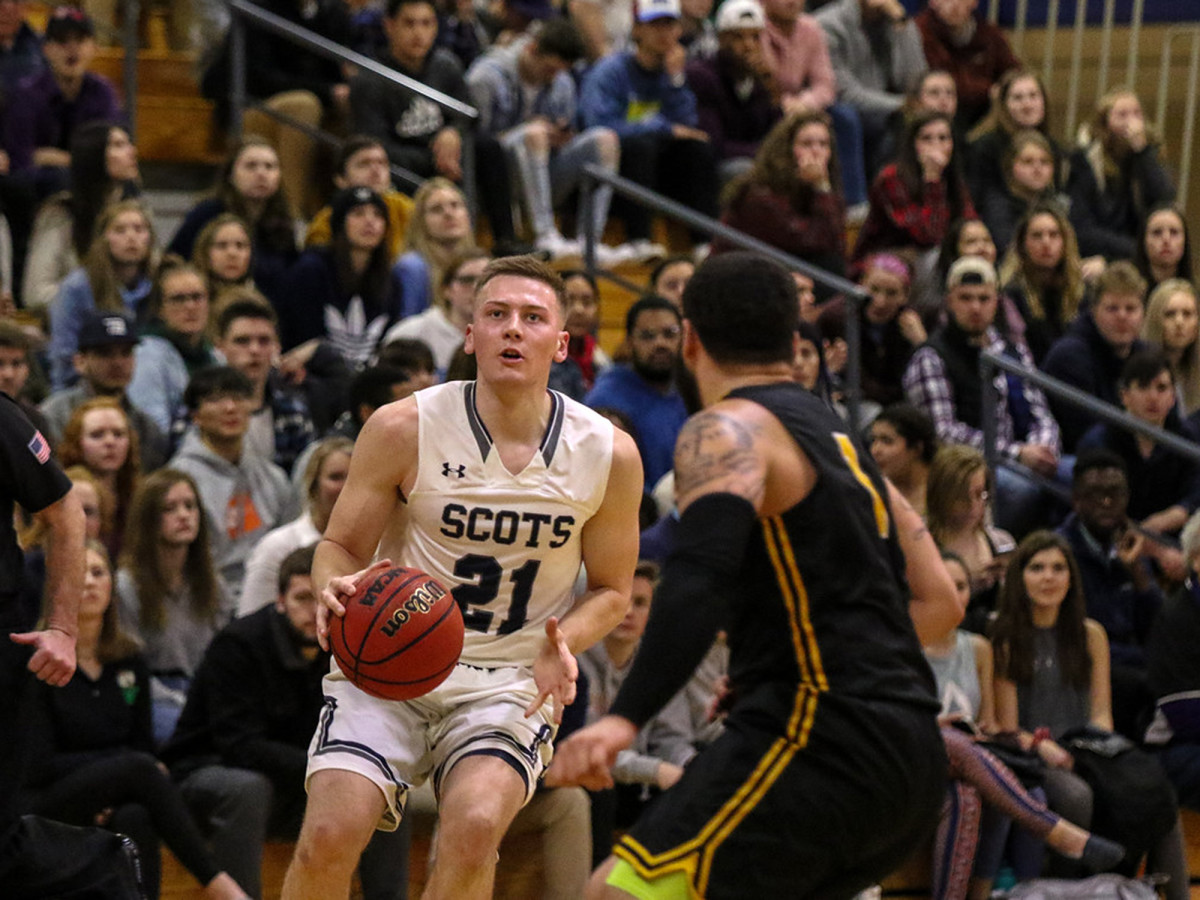From Way Outside: He's Averaging 33.3 Points and You Don't Know His Name

Five … Six … Seven …
Eric Demers launches not shots but repeating rainbows, and their arcs overlap, tracing a parabola as pure as a starlit New England winter’s evening. Such a night finds college basketball’s leading scorer hoisting dozens of three-pointers inside a converted mechanic’s garage in Salem, Mass. The fifth-year senior guard at (Division III) Gordon College has conscripted a visitor to rebound, and his new bride, Lauren, to feed him. The exercise is rhythmic and, for his aides, relatively effortless.
Eight … Nine … Ten ... Demers averages 33.3 points per game and has eclipsed 30 in 15 of his last 15 outings, with a season-high 49 back in December, against Nichols College. That scoring average, though? It should be higher. Last November, in an exhibition against Hartford that by NCAA rule counts on the record books for only the Division I side, Demers scored 42 points that are not reflected in his average. “They were triple-teaming me,” says Demers, who stands 6' 1". “Do they really need three D-I dudes to guard a single D-III guy?”
“The irony,” Lauren chimes in, “is that Eric hates attention.”
Eleven … Twelve … Thirteen … No one graduates summa cum laude without a clandestine nook for undisturbed study. Likewise, the nation’s leading scorer maintains a covert off-campus hoops lab. Tony Gallo Athletics, where Demers is honing his craft this evening, is a windowless, aluminum-sided complex in a distressed industrial area. From the exterior, the gym is redolent of a scene out of The Departed—the type of block where you’d expect shots to be fired, not attempted.
On any given night, Demers punches a key code outside and enters a hardwood sanctum about a third the size of a regulation court. The upside? It has three hoops and provides total privacy. This is his basketball Brigadoon. “I told the owner: ‘I’m just a poor, married college kid; can we cut a deal?’” Demers says. “He charges me $100 a month, and I’m allowed access whenever he’s not training people.”
Fourteen … Fifteen … Six— “How many in a row is that?” Lauren asks, right as her husband’s wrist flicks. The shot rims in and out. Eric smiles ruefully. And starts over.
In a city made infamous three centuries ago by the purported use of black magic, Demers often finds himself shooting during the witching hour. On a recent Friday evening, he and Lauren, who were married last August, planned a family night. Stay in, watch a movie. By 10:30 p.m. Eric grew restless. “Honey, do you mind if I go shoot?”
And off they went.
* * *

On Feb. 11, Demers dropped a perfunctory—for him—31 points in an 83-74 win over Roger Williams University. “At one point, one of their players said, ‘You better save some [shots], cuz you’re gonna run out,’” Demers recalls. “And I thought, Have you been watching much?”
Better yet: Has anyone outside the idyllic Gordon College campus been watching?
With even 29 points in the Fighting Scots’ regular season-ender against Nichols on Saturday (before a Commonwealth Coast Conference tournament game next Tuesday), Demers, a senior, will become only the sixth player this century, at any level, to average 33 or more across a season. Which hardly seems much of an obstacle considering that on three separate occasions this year—including that December decimation of Nichols’s perimeter defense—he has buried nine threes in a game. But who knows or cares? Demers may be the only player in America whose shooting range circumscribes a greater area than his renown.
Even on this sylvan campus, where Teddy Roosevelt used to play polo on the quad (not as a student—he attended Harvard), Demers’s hoops celebrity is, at best, underacknowledged. Informed that the school president, Michael Lindsay, pulled this writer into his office for an unsolicited confab, Demers grins and shakes his head. “I’ve never met our president,” he says.
In a metropolitan area more flush with college students than any other on the planet, Demers is, at least if you judge by Google searches, merely one of them. Stillpoint, the Gordon College magazine that is published once a semester, makes no mention of the three-point threat in either issue this academic year. The upside of this anonymity? If Demers fails to land a pro contract, here or overseas, he can become a real-life Billy Hoyle.
“I’ve thought about that,” he says of Woody Harrelson’s White Men Can’t Jump character, with a knowing smile.
* * *

Eric Demers went straight from the crib to the basket. “As soon as he was old enough to sit up, about six months,” says his father, Jim, “we bought him a little plastic ball and a hoop. He’d put the ball through the hoop, over and over and over. Not much has changed.”
Growing up in Acushnet, Mass., a half-hour’s drive southeast of Providence, Demers is the lad who trudged through the snow to shoot baskets at nearby Pope Park. Who engaged in epic indoor battles against his younger brother on the hoop in the basement. Who asked Santa for a basketball every Christmas. And who still does. “My mom got me a FIBA ball last Christmas and an NBA ball this Christmas,” he says.
Perhaps serendipitously, the condo where Eric and Lauren now reside has 15-foot ceilings. The former wasted no time installing a regulation hoop with a fiberglass backboard that looms over the den. “Eric is not handy with tools,” says his mother, Ann Marie, “but he was able to put up that basket in no time.”
Sitting in his second-floor office in Gordon’s athletic center, Scots coach Tod Murphy points through the bare trees to a housing development less than half a mile south. “I live that close,” says Murphy, 56, who played five NBA seasons in the late ’80s and early ’90s. “Eric has phoned me on several occasions, late at night, and asked me to open up the gym. My wife isn’t thrilled.”
Murphy, of course, always opens the gym. And remains until Demers finishes.
K.J. Baptiste is a grad assistant at Penn State, and he runs summer games around the Boston area. Division I players … G League guys … even the occasional fringe NBA baller. The only Division III player Baptiste invites is Demers. “We play in a gym with no air conditioning,” says Baptiste, 25, “and one night we ran four, five games in a row. Guys are gassed, sprawled out, sucking down Gatorade, pulling off their sneakers. And Eric’s at the far end, getting off his 20 shots per spot from five different spots. And the NBA guys are like, ‘Is he like that every day?’”
“I say: ‘Eric, you’re making the pros feel guilty.’”
Baptiste says with total conviction that Demers could play at any Division I school, but he acknowledges the young man was no blue-chip prospect. At Falmouth (Mass.) High the varsity coach, Paul Lundberg, remembers espying a lanky sophomore on the jayvee squad who was “not strong but also slow.” “Is he ever going to play for us?” he asked an assistant. Then Demers drained 36 one night, purely as a spot-up shooter.
Seven years later, Peter McLelland, a Gordon alumnus who chronicles the team’s endeavors on his blog, Writing Scots, assesses the nation’s leading scorer thusly: “Eric doesn’t have a ‘range.’ Wherever he gets the ball, that’s it.”
“At least 100 times during Eric’s career I’ve said: ‘That’s a bad shot’ as he took it,” adds Murphy. “And it went in.”
Some saw Demers’s greatness coming. Others didn’t. After Eric scored 18 points in his third game as a Gordon freshman in 2016, his father, Joe, a longtime coach at Falmouth High, approached Scots assistant Josh Thies. Eric, his dad argued, could easily average 27 a game, if only they got him more touches. Thies, now an assistant at Division II UC Colorado Springs, laughs at the memory: “I remember thinking, Does he know we have juniors and seniors on this team? But I also thought, He’s probably correct.
“And you know what? The head coach at my current school asks me every day, ‘Why isn’t that kid playing here?’”
If others have lacked faith in Demers, he’s made up for it with faith in himself. Particularly in his jumper. That 42-point outing against Hartford last November, which was televised on ESPNU? He started one-of-nine from the floor. And kept shooting.
“From Day One here, Eric believed he was the best player on the court,” says Murphy. “He always had talent and a tremendous amount of confidence. But he’d get moody. Easily frustrated. He was his own worst enemy freshman year.”
And sophomore year. In November 2016, after doing poorly in a particular practice drill, Demers punched the court in a fit of pique. In doing so he broke a bone in his right hand. His shooting hand. “My lowest moment,” says Demers, who showed up at practice the next day shooting left-handed. The coaching staff steered him toward a medical redshirt year instead.
That winter Demers often retreated to a local YMCA to find games as he recuperated. And there he met Matt Chewning, a former Division III baller at Eastern Nazarene (in Quincy, Mass.), who in the rehabbing sophomore saw a bit of himself before he found his own faith. Chewning and his wife run a small ministry in the area, and after a few months he had an idea. “I invited Eric to move in with us,” says Chewning, who himself has four children under 17. “In our family we’re big on two things: authority and affection. Eric seemed to need plenty of both.”
At Gordon, students attend a mandatory chapel service three days a week. Undoubtedly, at some point during their four years, they hear that the Lord works in mysterious ways. Demers was about to discover the verity of that axiom. He spent the first few months observing his surrogate family, as if he were studying abroad. Picture Bart Simpson taking up residence at the Flanders’s. “He’d ask us questions like, ‘How do I not go out with all these girls?’ says Chewning. “Eric seemed unsettled when he arrived. But being around my kids … pretty soon they were asking if he could tuck them in. I’ve never seen somebody grow so much as a man in one year.”

That was the year Demers asked out Lauren, an education major at Gordon, whom he met at a worship night. At first, she wasn’t particularly interested (“I thought he was a player,” she says), and Demers sensed as much. So on their first date he took along Chewning’s nine-year-old daughter, Ella. “I figured, if the date went south,” says Demers, “I’d at least have someone to talk to.”
By the end of the night Ella had fallen in love with Lauren, and he’d fallen pretty hard himself. The couple wed 18 months later. During the wedding weekend, Eric found time to get in some shots. Lauren dutifully rebounded.
Married life agrees with Demers, who harbors aspirations of playing abroad next year. “It’s funny,” he says. “Some of my teammates kidded me that as soon as I got married, my scoring average would go down five points per game. It’s actually increased by 10.”
With that, Demers finishes his workout in Salem the same way he finishes every other one: 10 consecutive free throws, each one a swish. “Hurry up,” begs Lauren. “I don’t want to miss our show.”
What will they watch?
“The Bachelor,” she says.
